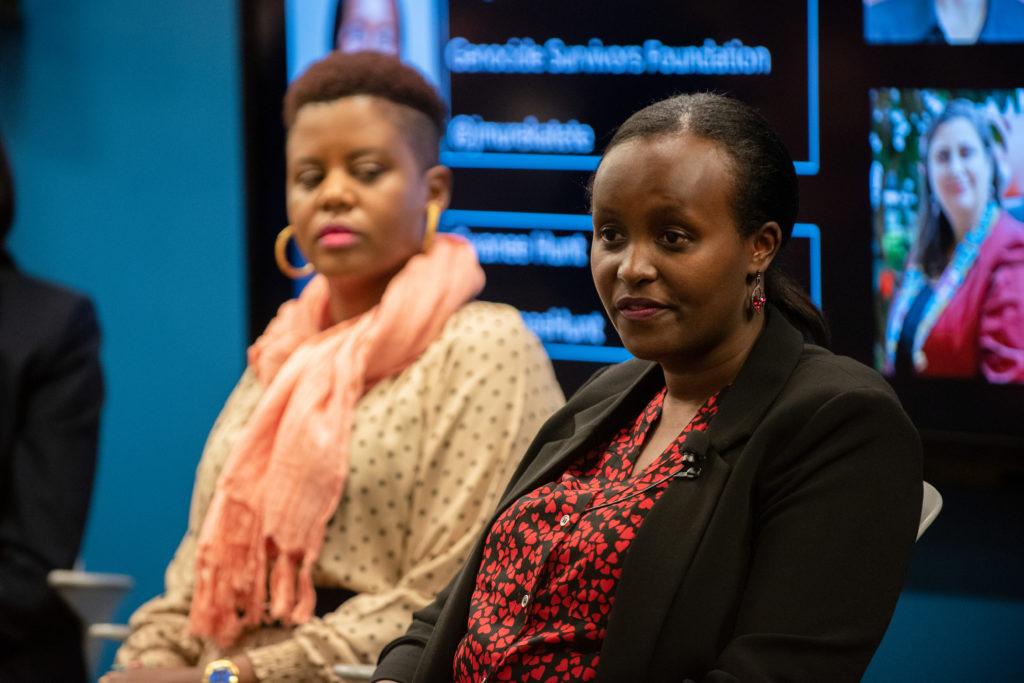Survivors of the Rwandan genocide in 1994 discussed the causes and effects of the tragedy and the current state of the country at the Elliott School of International Affairs Wednesday.
A panel of five survivors of the genocide discussed the roots of the genocide and the country in the aftermath of the event, during which an estimated 800,000 people were murdered as the country’s Hutu majority sought to eradicate the Tutsi minority. About 100 people attended the event, which was hosted by the Gender Equality Initiative in International Affairs and the Institute of African Studies.
Jacqueline Murekatete, a human rights lawyer who founded the Genocide Survivors Foundation, was 9 years old when the genocide started, and she lost her immediate family in the genocide. She said the genocide wasn’t created “in a vacuum” – it was preceded by state-sanctioned anti-Tutsi discrimination and propaganda.
“It’s very important for us to help our audiences recognize that genocide as a crime is not a crime that happens overnight,” Murekatete said. “People do not wake up one morning and decide to take up machetes.”
The genocide, which lasted three months, ended when the primarily Tutsi Rwandan Patriotic Front took control over most of the country, including its capital.
She added that addressing the consequences of genocide similarly does “not happen overnight.” She said the country is still facing issues with trauma, poverty and few opportunities for higher education for orphans of genocide.
“We think that 25 years – sometimes I go to fundraise for Genocide Survivors Foundation and people are like ‘It’s been 25 years, everything should be perfect,’” Murekatete said. “But it’s hard for me to even understand what that means.”
Peace Grace Muhizi, an activist and international relations student at Agnes Scott College in Georgia, was born during the genocide and does not remember the genocide’s events but experienced the genocide’s aftermath. Muhizi, whose parents were killed in the genocide, said the poverty she experienced following the genocide was “a matter of feeling the pain of those who actually lived the reality of the genocide.”
Muhizi said Rwanda was in a “hopeless place” 25 years ago but is now not only “thriving” but serving as an example to other nations. Sixty-four percent of the Rwandan government’s parliamentary seats are occupied by women, who are guaranteed 30 percent of seats by law.
“I would say that wasn’t just the work of one man, it was the work of every single person living in Rwanda,” she said. “And I would say that’s what we’re celebrating today as women.”
Jeanne Celestine Lakin, an author and orphan advocate, recalled seeing her father cry for the first time on the second day of the genocide and realizing as a 9 year old that she was not safe. Lakin said she spent three months in the bushes, sustaining herself on a “vegetarian diet” where “flowers became dessert.”
She said the Rwandan government used rape as a weapon during the genocide. An estimated 250,000 to 500,000 women and girls were raped in the genocide – Lakin was among them.
“I didn’t want to use the story of my survivor as a sad story,” she said. “I wanted to use that story to empower orphans and widows and survivors.”
Lakin said genocide survivors living in the U.S. are given resources like food and shelter but lack a sense of community because of language and cultural barriers. She added that non-governmental organizations need to understand Rwandan cultural norms better to help genocide survivors.
“If you want to make an impact in a community, you have to be able to understand what the community looks like, you have to be able to understand the cultural norms and all these things,” Lakin said.
Consolee Nishimwe, who was 14 years old when the genocide started, said it was particularly difficult for women to find safe places to hide. Nishimwe said she was raped by a neighbor she knew “very well” and later learned she was HIV-positive.
“Sometimes it’s not very easy for us survivors, but we have to continue to live,” Nishimwe said. “And some of us live with the consequences because of what we’ve been through during the genocide.”
Liliane Pari Umuhoza, who founded the Women Genocide Survivors Retreat, was 2 years old during the genocide.
“We were raised in a country that was completely destroyed, and what the state destroyed is not just about infrastructure, but people’s hearts – people were hopeless, and there was no life,” she said.
Umuhoza now works with rape victims from the genocide, including those who contracted HIV or who are raising children who were conceived in rape. She said she decided to enter this line of work after returning to Rwanda during college for an internship, where she was tasked with translating stories from the genocide to English.
She said she found herself in a “sea of stories” she could not handle and had not heard before, adding that she believes supporting survivors and sharing their stories is a way of preventing genocide.
“There is power when people share their stories,” she said. “People relate, people heal.”




